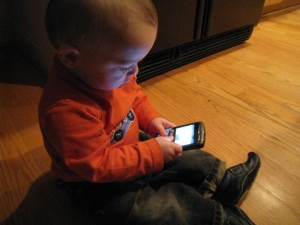Month: July 2009
Somebody is ready for the beach
Man of many utensils
New bike!
Thanks, Grampy!
Five pieces of advice for job seekers
Laurie Ruettimann of the Punk Rock HR blog is seeking your best advice for jobseekers. Despite all the articles, books and blog posts out there telling people how to land their dream job, people still miss some fundamental things. Plus, as we all know, it’s a tough market. If you’ve got some good advice, go contribute at Laurie’s blog.
Ironically, I’m writing this post in a coffee shop in Raleigh, sitting next to a woman who has been conducting interviews all morning. One piece of advice gleaned from eavesdropping: If the interviewer asks if you consider yourself a people person, she is expecting the answer “yes.”
Here are the first few pieces of advice that came to my mind:
1. Start “or revive, or continue” a blog and write as though you were already a valued member of the profession where you want to work. Make it part of your daily job search routine. I don’t mean be pretentious and tell everybody how smart you are; I mean write about topics in your industry and contribute what you can. Don’t just write daily about the fact that you want a job and can’t find one. Try to write posts that would make a prospective employer think, “Damn, I wish she was writing this on our blog.”
Hopefully it goes without saying that you should be following the influential bloggers in your field, both nationally and locally.
2. Make sure you have a professional email address, like firstname.lastname@gmail.com. I’ve been put off in the past by jobseekers with immature-sounding email addresses. “SurferGrrlll@hotmail.com” tells me you’d rather be surfing than working. I won’t necessarily hold that against you once I get to know you, but don’t lead off with it.
3. Set up a Twitter account “again, I suggest FirstnameLastname” and follow everyone you can in the field where you want to work, or better yet, at the companies where you want to work. Use it to learn from them and communicate with them where appropriate, but don’t stalk them. Follow the people they follow.
4. Do the same thing with LinkedIn. Use it as the valuable source of information it is, but again not as a stalking tool. If you go into an interview knowing the groups your prospective manager belongs to and the conferences she’s going to this year, don’t you think that will make you sound like you understand the industry?
5. Take phone interviews from a landline phone in a quiet place, not a mobile phone. Don’t make the interviewer work to understand you. And when the interviewer calls you, answer the phone professionally, the way you would if you had the job: “Hello, this is Jenny Jobseeker” I’ve conducted dozens of phone interviews, and it’s very annoying when you have to go through this every time:
“Hello?
“Hi, this is Dave Thomas, may I speak to Jenny Jobseeker please?
“This is Jenny”
By that point I just want to say, “Weren’t you expecting my call?” It makes you sound surprised and unprepared.
Originally published on Conversations & Connections, my SAS social media blog
Killing the myth of corporate perfection
 Recently I speculated about the future audience I’ll be talking with in 20 years. Despite being someone who thinks on a daily basis about communicating as a brand, I think that mindset is on the way out. I don’t mean we shouldn’t have brand standards and think about how our communications reflect on our company, or try to have consistent messages and useful content. I mean that in 20 years, the idea of a company will be completely different.
Recently I speculated about the future audience I’ll be talking with in 20 years. Despite being someone who thinks on a daily basis about communicating as a brand, I think that mindset is on the way out. I don’t mean we shouldn’t have brand standards and think about how our communications reflect on our company, or try to have consistent messages and useful content. I mean that in 20 years, the idea of a company will be completely different.
My father’s generation responded well to the idea of a corporate entity. And no wonder; the military/industrial complex had just defeated the Nazis. What was good for General Motors really was good for America. They still firmly believed you could work for a corporation your entire life and the corporation would take care of you. My generation knows that ideal is nearly gone. My son’s generation will probably see it as quaint as dial phones.
Each succeeding generation has responded differently to the idea of corporate perfection. Will future generations respond better to brands, or to people? At the Society for New Communications Research’s NewComm Forum, Dr. Mihaela Vorvoreanu from Clemson gave us the results of her survey of college students and how they relate with brands on Facebook. The gist: “Being friended by a corporation is creepy.”
People these days react poorly to “Mistakes were made” and positively to “We screwed up.” Why? Because we can relate to other people screwing up, because we’ve all screwed up. And we can forgive that. Maybe we expect companies to be perfect, but we expect people to be human.
Todays kids won’t expect everything to be buttoned down and perfect. The cracks and fissures won’t put them off. It’s the cracks and fissures that will convince them we are real people they can trust.
Originally published on Conversations & Connections, my SAS social media blog